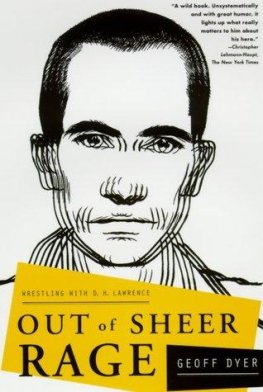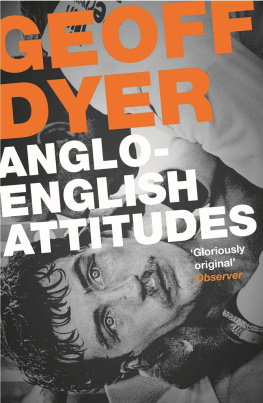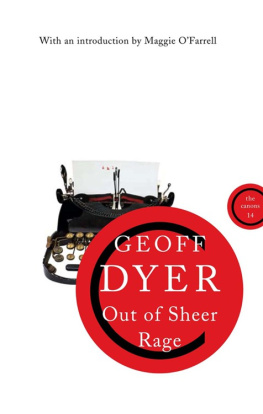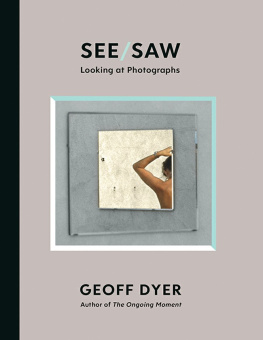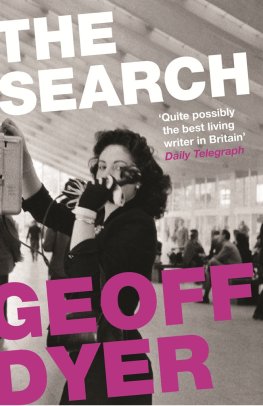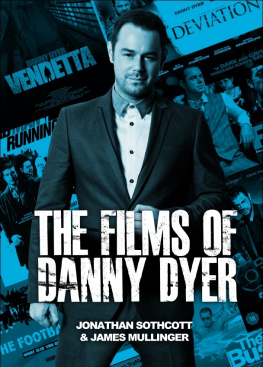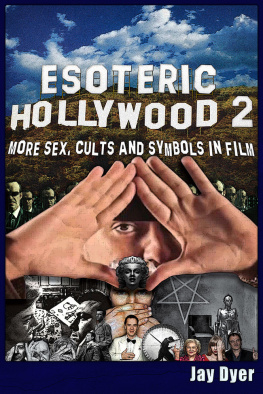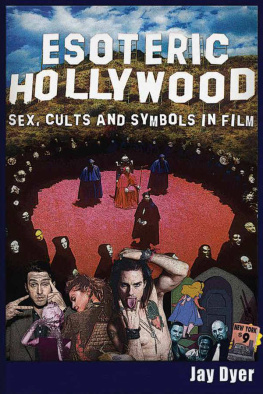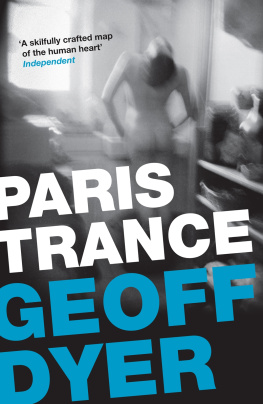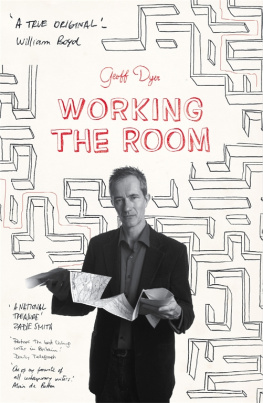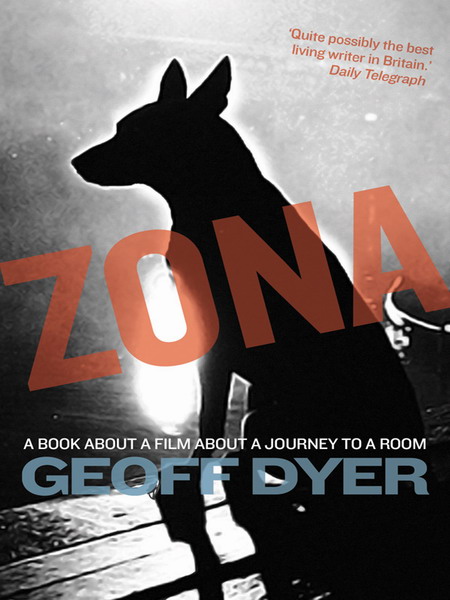
PRAISE FOR GEOFF DYER
Possibly the best living writer in Britain. Daily Telegraph
Dyer writes like a dream. Australian
A national treasure. Zadie Smith
Dyer is a witty and concise observer of landscapes: social, geographical and emotionalHis eccentric charm and barbed perceptiveness will hook you to the end.
The Times
One of my favourite of all contemporary writers.
Alain de Botton
His work exudes an interpretative energy that breathes ideas like spring water on ancient stone, and goes straight to the heart. Canberra Times
Geoff Dyer is a true originalone of those rare voices in contemporary literature that never ceases to surprise, disturb and delight. Risky, breathtakingly candid, intellectual, cool, outrageous, laconic and sometimes shocking, Geoff Dyer is a must-read for our confused and perplexing times. William Boyd
Dyers style is studiedly conversational and discursive, frequently very funny. Telegraph
Geoff Dyers books include But Beautiful, winner of the Somerset Maugham Prize, Out of Sheer Rage, a National Book Critics Circle Award finalist, the essay collection Working the Room and the novel Jeff in Venice, Death in Varanasi. He lives in London and contributes to the Observer, Guardian, New Statesman and New York Times. geoffdyer.com
textpublishing.com.au
The Text Publishing Company
Swann House
22 William Street
Melbourne Victoria 3000
Australia
Copyright Geoff Dyer 2012
All rights reserved. Without limiting the rights under copyright above, no part of this publication shall be reproduced, stored in or introduced into a retrieval system, or transmitted in any form or by any means (electronic, mechanical, photocopying, recording or otherwise), without the prior permission of both the copyright owner and the publisher of this book.
First published in the United Kingdom by Canongate Books Ltd, 2012
First published in Australia by The Text Publishing Company, 2012.
Cover design by W. H. Chong
Page design by M. Kristen Bearse
ISBN 9781921922060
eISBN 9781921921568
TO REBECCA
I watched the film until the film itself became a kind of blindness.
G. C. Waldrep, D. W. Griffith at Gettysburg
After all, the best way of talking about what you love is to speak of it lightly.
Albert Camus, A Short Guide to
Towns Without a Past
AN EMPTY BAR, possibly not even open, with a single table, no bigger than a small round table, but higher, the sort you lean againstthere are no stoolswhile you stand and drink. If floorboards could speak these look like they could tell a tale or two, though the tales would turn out to be one and the same, ending with the same old lament (after a few drinks people think they can walk all over me), not just in terms of what happens here but in bars the world over. We are, in other words, already in a realm of universal truth. The barman comes in from the backhes wearing a white barmans jacketlights a cigarette and turns on the lights, two fluorescent tubes, one of which doesnt work properly: it flickers. He looks at the flickering light. You can see him thinking, That needs fixing, which is not the same thing at all as Ill fix that today, but which is very nearly the same as Itll never be fixed. Daily life is full of these small repeated astonishments, hopes (that it might somehow have fixed itself overnight) and resignations (it hasnt and wont). A tall mana customer!enters the bar, puts his knapsack under the table, the small round table you lean against while drinking. Hes tall but not young, balding, obviously not a terrorist, and theres no way that his knapsack could contain a bomb, but this unremarkable actionputting a knapsack under the table in a baris not one that can now go unremarked, especially by someone who first saw Stalker (on Sunday, February 8, 1981) shortly after seeing Battle of Algiers. He orders something from the barman. The fact that the barmans jacket is white emphasizes how not terribly clean it is. Although its a jacket it also serves as a towel, possibly as a dishcloth, and maybe as a hankie too. The whole place looks like it could be dirty but its too dingy to tell and the credits in yellow Russian letterssci-fi Cyrillicdo not exactly clarify the situation.
Its the kind of bar men meet in prior to a bank job that is destined to go horribly wrong, and the barman is the type to take no notice of anything thats not his business and the more things that are not his business the better it is for him, even if it means that business is so slow as to be almost nonexistent. Far as hes concerned, long as hes here, minding his own business and wearing his grubby barmans jacket, hes doing his job, and if no one comes and no one wants anything and nothing needs doing (the wonky light can wait, as can most things) its all the same to him. Still smoking, he trudges over with a coffeepot (hes one of those barmen who has the knack of imbuing the simplest task with grudge, making it feel like one of the labours of a minimum-wage Hercules), pours some coffee for the stranger, goes out back again and leaves him to it, to his coffee, to his sipping and waiting. Of that there can be no doubt: the stranger is definitely waiting for something or someone.
A CAPTION: some kind of meteorite or alien visitation has led to the creation of a miracle: the Zone. Troops were sent in and never returned. It was surrounded by barbed wire and a police cordon
This caption was added at the behest of the studio, Mosfilm, who wanted to stress the fantastical nature of the Zone (where the subsequent action will be set). They also wanted to make sure that the bourgeois country where all this happened could not be identified with the USSR. Hence this mysterious business of the Zone all happenedaccording to the captionin our small country, which put everyone off the scent because the USSR, as we all know, covered a very large area and Russia was (still is) huge too. Russia, I can hear Laurence Olivier saying it now, in the Barbarossa episode of The World at War. The boundless motherland of Russia. Faced with the German invasion of 1941, Russians fell back on the traditional strategy, the strategy that had done for Napoleon and would do for Hitler too: Trade space for time, a message Tarkovsky took to heart.
THE SOUND OF WATER DRIPPING. We peer through an interior set of doors, into a room. In film-script shorthand Int means Interior and Ext Exterior. This is a kind of Super-Int or Int-int. Inside already, the camera inches deeper inside. Its as if Tarkovsky has started where Antonioni left off in the famous inside-out shot at the end of The Passenger and taken it a stage further: inside-in. As slow as thatbut without the colour. Antonionis earlier Red Desert (1964) would, as the title suggests, be unimaginable without the colour. The colourMonica
Even to describe the black-and-white of Stalker as black-and-white is to tint what were seeing with an inappropriate suggestion of the rainbow. Technically this concentrated sepia was achieved by filming in colour and printing in black-and-white. The result is a kind of submonochrome in which the spectrum has been so compressed that it might turn out to be a source of energy, like oil and almost as dark, but with a gold sheen too. As well as the dripping there is a certain amount of creaking and other spooky noises that are not easy to explain. We are in the room now, looking at a bed.
A TABLE, A BEDSIDE TABLE, by definition far lower than the table in the bar. The rumble of some kind of transport causes the contents of the table to rattle. The vibrations are enough to make a glass of water shudder halfway across the table. Remember this. Nothing that happens in




